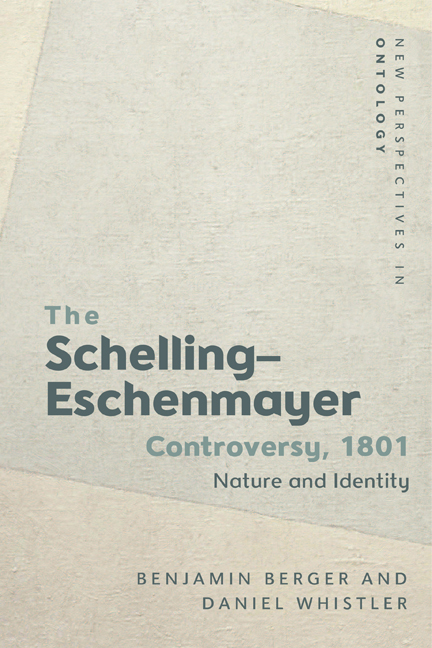Book contents
- Frontmatter
- Contents
- Preface
- Translators’ Note
- Abbreviations
- Introduction: Schelling and Eschenmayer in 1801
- Part I Texts
- Spontaneity = World Soul, or the Highest Principle of Philosophy of Nature
- On the True Concept of Philosophy of Nature and the Correct Way of Solving its Problems
- Part II Commentaries
- 1 Quality
- 2 Potency
- 3 Identity
- 4 Drive
- 5 Abstraction
- Part III Appendices
- Appendix 1 Correspondence, 1799–1801
- Appendix 2 Principles of Nature-Metaphysics Applied to Chemical and Medical Subjects [Extracts]
- Appendix 3 Deduction of the Living Organism [Extracts]
- Appendix 4 Review of F. W. J. Schelling’s First Outline of a System of Philosophy of Nature and Introduction to his Outline
- Notes
- Bibliography
- Index
Appendix 3 - Deduction of the Living Organism [Extracts]
Published online by Cambridge University Press: 03 October 2020
- Frontmatter
- Contents
- Preface
- Translators’ Note
- Abbreviations
- Introduction: Schelling and Eschenmayer in 1801
- Part I Texts
- Spontaneity = World Soul, or the Highest Principle of Philosophy of Nature
- On the True Concept of Philosophy of Nature and the Correct Way of Solving its Problems
- Part II Commentaries
- 1 Quality
- 2 Potency
- 3 Identity
- 4 Drive
- 5 Abstraction
- Part III Appendices
- Appendix 1 Correspondence, 1799–1801
- Appendix 2 Principles of Nature-Metaphysics Applied to Chemical and Medical Subjects [Extracts]
- Appendix 3 Deduction of the Living Organism [Extracts]
- Appendix 4 Review of F. W. J. Schelling’s First Outline of a System of Philosophy of Nature and Introduction to his Outline
- Notes
- Bibliography
- Index
Summary
Preface
[329] [To describe] which systematic approach to take in medicine, from the standpoint at which the progress of the last decades has placed us, is a task that places us in no small discomfort.
We have seen a manifold struggle before us, systems followed by systems, theories, hypotheses – here set against one another, there united together into a third – principles inferred back from experience, which, when established as principles, soon lost their universality after further observation. Always driven on by the need for a unity of principles, we seized onto this or that opinion, held to it for a while, before returning unsatisfied to ourselves. Always we strove to circumscribe the outer limits of our scientific domain, insert the middle terms, so that [the limits] could finally touch in the middle. But this task soon broke down with the insight [330] that our domain was still too restricted, that our outer limits were themselves still middle terms. From the comparison of a host of experiences emerged a rule, from the comparison of a host of rules emerged a principle. We saw that such a principle expressed the unity of all our experiences even less than our source of experience was able to be thereby exhausted; and yet we seduced ourselves with the hope that what we have yet to experience would conform to this principle, even if later observations taught otherwise. Tired of these unavailing attempts we even intervened in a foreign domain (chemistry), which presented itself as just as empirical as our own, but in this case because of the novelty of its conquests; we searched for principles there, this lasted a while and we returned discontented.
With all these efforts, we were unable to acquire anything of nature, to walk alongside the tranquil movement of the living organism, always identical with itself yet always changing in itself according to unchangeable laws, and it returned as a problem, always renewing itself from one decade to the next.
[331] Where now to begin? Where to end? The sum of knowledge has grown into a mass; to sort it out is [a task which] we must completely abandon out of hand.
- Type
- Chapter
- Information
- The Schelling-Eschenmayer Controversy, 1801Nature and Identity, pp. 205 - 214Publisher: Edinburgh University PressPrint publication year: 2020

